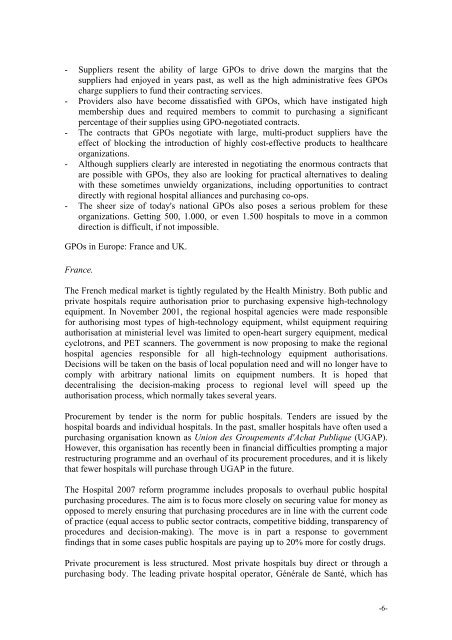GPOs and Advances Purchasing Mechanism - IESE Blog Community
GPOs and Advances Purchasing Mechanism - IESE Blog Community
GPOs and Advances Purchasing Mechanism - IESE Blog Community
Create successful ePaper yourself
Turn your PDF publications into a flip-book with our unique Google optimized e-Paper software.
- Suppliers resent the ability of large <strong>GPOs</strong> to drive down the margins that the<br />
suppliers had enjoyed in years past, as well as the high administrative fees <strong>GPOs</strong><br />
charge suppliers to fund their contracting services.<br />
- Providers also have become dissatisfied with <strong>GPOs</strong>, which have instigated high<br />
membership dues <strong>and</strong> required members to commit to purchasing a significant<br />
percentage of their supplies using GPO-negotiated contracts.<br />
- The contracts that <strong>GPOs</strong> negotiate with large, multi-product suppliers have the<br />
effect of blocking the introduction of highly cost-effective products to healthcare<br />
organizations.<br />
- Although suppliers clearly are interested in negotiating the enormous contracts that<br />
are possible with <strong>GPOs</strong>, they also are looking for practical alternatives to dealing<br />
with these sometimes unwieldy organizations, including opportunities to contract<br />
directly with regional hospital alliances <strong>and</strong> purchasing co-ops.<br />
- The sheer size of today's national <strong>GPOs</strong> also poses a serious problem for these<br />
organizations. Getting 500, 1.000, or even 1.500 hospitals to move in a common<br />
direction is difficult, if not impossible.<br />
<strong>GPOs</strong> in Europe: France <strong>and</strong> UK.<br />
France.<br />
The French medical market is tightly regulated by the Health Ministry. Both public <strong>and</strong><br />
private hospitals require authorisation prior to purchasing expensive high-technology<br />
equipment. In November 2001, the regional hospital agencies were made responsible<br />
for authorising most types of high-technology equipment, whilst equipment requiring<br />
authorisation at ministerial level was limited to open-heart surgery equipment, medical<br />
cyclotrons, <strong>and</strong> PET scanners. The government is now proposing to make the regional<br />
hospital agencies responsible for all high-technology equipment authorisations.<br />
Decisions will be taken on the basis of local population need <strong>and</strong> will no longer have to<br />
comply with arbitrary national limits on equipment numbers. It is hoped that<br />
decentralising the decision-making process to regional level will speed up the<br />
authorisation process, which normally takes several years.<br />
Procurement by tender is the norm for public hospitals. Tenders are issued by the<br />
hospital boards <strong>and</strong> individual hospitals. In the past, smaller hospitals have often used a<br />
purchasing organisation known as Union des Groupements d'Achat Publique (UGAP).<br />
However, this organisation has recently been in financial difficulties prompting a major<br />
restructuring programme <strong>and</strong> an overhaul of its procurement procedures, <strong>and</strong> it is likely<br />
that fewer hospitals will purchase through UGAP in the future.<br />
The Hospital 2007 reform programme includes proposals to overhaul public hospital<br />
purchasing procedures. The aim is to focus more closely on securing value for money as<br />
opposed to merely ensuring that purchasing procedures are in line with the current code<br />
of practice (equal access to public sector contracts, competitive bidding, transparency of<br />
procedures <strong>and</strong> decision-making). The move is in part a response to government<br />
findings that in some cases public hospitals are paying up to 20% more for costly drugs.<br />
Private procurement is less structured. Most private hospitals buy direct or through a<br />
purchasing body. The leading private hospital operator, Générale de Santé, which has<br />
-6-
















